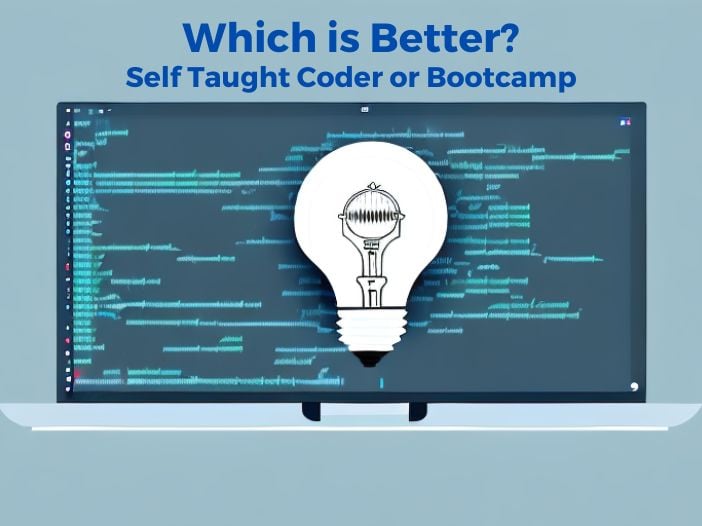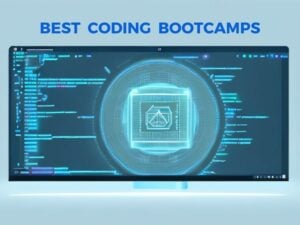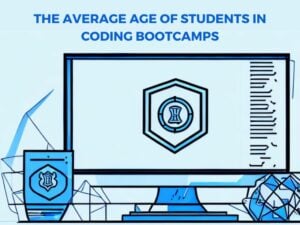When it comes to learning to code, there are many paths you can take.
Two popular options are to teach yourself or attend a coding bootcamp.
Both options have their advantages and disadvantages, but which is better?
In this article, we’ll explore the pros and cons of each and help you decide which approach is right for you.
Understanding the self-taught coder journey
Teaching yourself to code can be a challenging yet rewarding experience.
Many successful programmers started as self-taught learners.
However, knowing what to expect and what resources are available is essential.
Learning to code is a journey that requires dedication and perseverance.
It’s not something that you can learn overnight, but with the right mindset and resources, anyone can become a proficient coder.
Pros of being a self-taught coder
One of the biggest advantages of being a self-taught coder is its flexibility.
You can learn to code at your own pace and schedule.
This means you can fit your coding education around your existing commitments, whether that’s work or family.
Another benefit is that you have the freedom to choose what languages and frameworks to learn.
This allows you to tailor your education to suit your needs and goals.
For example, if you’re interested in web development, you can focus on learning HTML, CSS, and JavaScript.
Self-taught coders also have the opportunity to develop a deep understanding of programming concepts.
Without the structure of a formal curriculum, you’ll need to be diligent in your studies and find resources that work best for you.
This can lead to a more comprehensive learning experience.
Cons of being a self-taught coder
Teaching yourself to code is not without its challenges.
One of the biggest hurdles to overcome is the lack of structure.
Without a clear path, it can be challenging to stay motivated and know what to learn next.
Another potential downside is the lack of peer support.
Self-taught learners may need access to a community of fellow students to ask questions or bounce ideas off of.
This can lead to feelings of isolation and make staying engaged with the learning process more challenging.
You must remember that learning to code is a journey, and it’s okay to encounter obstacles along the way.
The key is staying motivated and pushing yourself to learn and grow.
Resources for self-taught coders
If you’re considering teaching yourself to code, many resources are available to help you get started.
Online tutorials, video courses, and coding bootcamps are all great options.
Many online learning platforms, such as Udemy, Coursera, and Codecademy, offer free and paid courses and resources for aspiring coders.
These resources can provide a solid foundation in programming concepts and help you build your skills.
Other great resources include coding forums like Stack Overflow and programming communities like GitHub.
These platforms provide a wealth of knowledge and support from experienced developers.
They can also be a great place to connect with other self-taught learners and connect with your peers.
It’s essential to remember that no matter what resources you choose to use, the most essential factor in your success as a self-taught coder is your own dedication and commitment to learning.
Exploring the bootcamp experience
Coding bootcamps have surged in popularity recently, offering a structured, immersive way to learn to code quickly at any age.
With the demand for skilled developers rising, coding bootcamps have become a popular choice for individuals looking to break into the tech industry.
Pros of attending a coding bootcamp
The structured curriculum is one of the most significant advantages of attending a coding bootcamp.
Bootcamps provide a clear path for students to follow, with a set curriculum and learning objectives designed to teach you the skills you need to get a job as a developer.
This structure can benefit those new to coding who may not know where to start.
In addition to the structured curriculum, coding bootcamps offer an immersive learning experience.
Bootcamps are typically full-time programs that last from a few weeks to a few months.
This intensive experience allows students to fully immerse themselves in the learning process and gain a deep understanding of programming concepts.
Many students find this immersive learning type is more effective than self-paced online courses or traditional classroom settings.
Another advantage of attending a coding bootcamp is the networking opportunities.
Bootcamps often have a built-in network of industry professionals and alumni who can provide guidance and support as you navigate your career.
This network can benefit those new to the industry who may not have an established network of their own.
Cons of attending a coding bootcamp
One of the biggest downsides of attending a coding bootcamp is the cost.
Bootcamps can be expensive, with some programs costing upwards of $10,000.
This is a significant financial investment, and not everyone has the means to pay for a bootcamp.
However, many bootcamps offer financing options or scholarships to help make their programs more accessible.
Another potential downside is the lack of flexibility.
Bootcamps have a set curriculum and schedule, which can be difficult for those who need to work around other commitments.
However, many bootcamps now offer part-time or online programs that can be more flexible for students who need to balance other responsibilities.
Types of coding bootcamps
There are many types of coding bootcamps available, ranging from full-time in-person programs to part-time online courses.
Some bootcamps specialize in specific languages or frameworks, while others offer a broader curriculum.
It’s essential to research your options before choosing a bootcamp to ensure that it meets your specific needs and goals.
Some bootcamps also offer specialized programs for underrepresented people in tech, such as women, people of color, and LGBTQ+ individuals.
These programs can provide a supportive and inclusive learning environment for individuals who may have faced barriers to entry into the tech industry.
Success stories of bootcamp graduates
Many bootcamp graduates have gone on to successful careers in the tech industry.
Companies like Google, Apple, and Airbnb have all hired bootcamp graduates.
Bootcamp graduates often have an advantage in the job market due to their focused, practical education.
They also benefit from a built-in network of peers and industry professionals, which can help them land jobs and advance in their careers.
However, it’s important to note that attending a bootcamp is not a guarantee of success.
Like any educational program, the value of a coding bootcamp ultimately depends on the effort and dedication of the individual student.
Coding bootcamps can be a valuable way to jumpstart your career in tech.
However, it’s essential to carefully consider the pros and cons before deciding.
With the right program and mindset, a coding bootcamp can be the first step towards a fulfilling and successful career in the tech industry.
Conclusion
Whether you teach yourself to code or attend a coding bootcamp, both approaches have pros and cons.
Ultimately, the best approach is the one that works for you and your specific needs and goals.
Self-learning may be the better option if you’re self-motivated and have the time and discipline to teach yourself.
However, if you’re looking for a structured curriculum, immersive learning experience, and a built-in network of peers and professionals, a bootcamp may be the way to go.
Regardless of your chosen path, the most important thing is to stay committed and keep practicing. Learning to code is a journey, but with the right resources and mindset, it can be a rewarding one.





